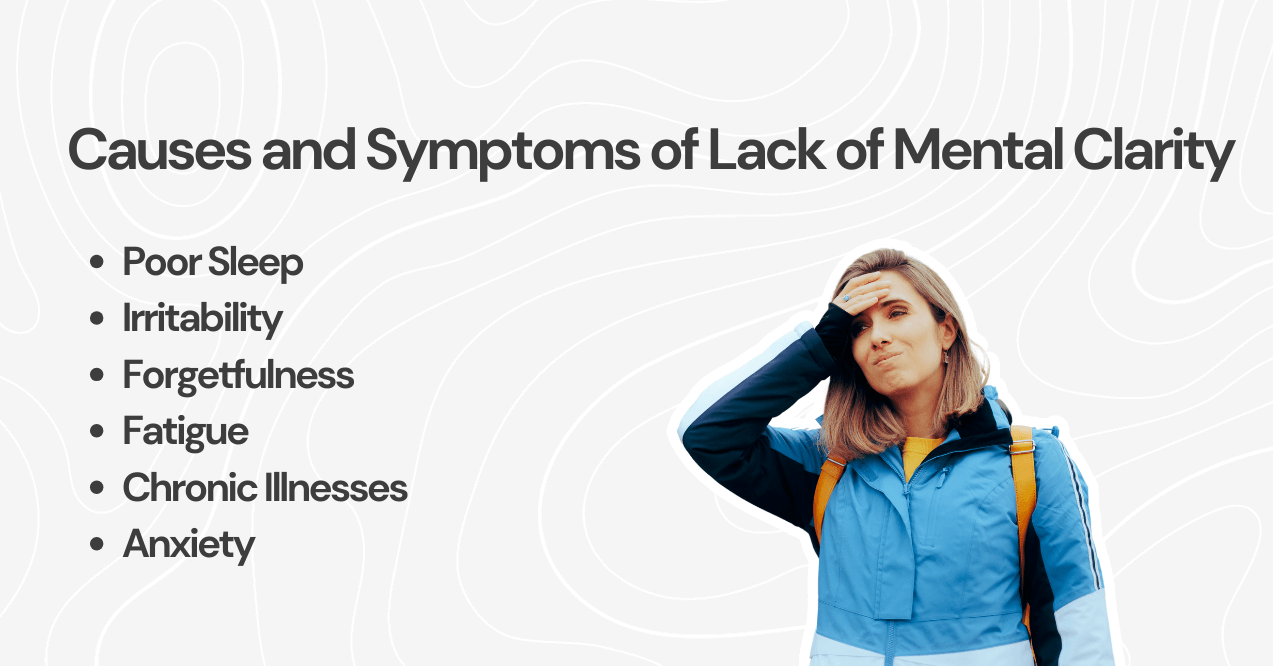How to Improve Mental Clarity: 7 Best Ways
Do you think you may need tips on how to improve mental clarity? Picture this: you are frantically searching for your car keys because you are late for a meeting and getting irritable. You even start shouting, ordering the family members to help in the search, only for your child to tell you the keys are in your pocket. Of course, you will wonder when you placed them there and why you cannot feel them in your pocket. When this happens, it is a signal that you need to declutter your mind.
Renowned Swiss psychiatrist Carl Jung once said that the mind is a pendulum that alternates between sense and nonsense. Since it can be a dangerous master and a beautiful servant, it is up to you to keep it in check by obtaining mental clarity.
Mental clarity is a clear state of mind, facilitating focus and being fully in the moment. It is essential because it enables you to process information much faster, thus allowing you to make quick decisions. You could lack mental clarity due to stress, fatigue, anxiety, poor diet, and insomnia. Some signs are irritability, mood swings, headaches, and forgetfulness. The good news is you can take back control of your mind by exploring natural methods, such as using superfood powders and performance supplements to enhance cognitive function and maintain a clear mind.
Key findings:

Causes and Symptoms of Lack of Mental Clarity

Before we delve into the deepest aspects of brain health and clarity, it is critical to understand the symptoms to watch out for and learn the causes. Some common symptoms that indicate a lack of mental clarity include:
Poor Sleep
A healthy person should fall asleep within 20 minutes after lying down. It is time to check your mental health when you toss and turn in bed for hours when you previously would have fallen asleep in minutes. You might finally fall asleep but then wake up in the middle of the night and find it difficult to fall back asleep.
Irritability
You cannot expect to always be happy, but if you find yourself getting angry at even the slightest inconvenience, take a step back and assess your mental health.
Forgetfulness
It is normal to forget things occasionally, but once it becomes too frequent that you cannot even remember you left the stove on, a mental clarity assessment is necessary.
Poor Concentration
You could be reading a book but find yourself stuck on one page for ten minutes because though you see the words, none of them are getting through to you.
Fatigue
While poor sleep is a clear sign of alarm, oversleeping and still feeling burnout are also abnormal. If you are constantly feeling tired, you could be lacking mental clarity. As for what causes a lack of mental clarity, there are many potential reasons, but the most usual suspects tend to be:
Nutrient Deficiencies
Your brain is the body’s most energy-consuming organ, so adequately feeding it is paramount for it to perform at its best. It performs poorly when your diet lacks certain nutrients, especially vitamin D, B12, iron, and magnesium.
Chronic Illnesses
Illnesses such as multiple sclerosis affect the brain. Therefore, patients have difficulty in critical thinking and experience forgetfulness. Other conditions that cause poor mental clarity are lupus, Alzheimer’s disease, and hyperthyroidism. Even intestinal, liver, or joint inflammation can cause brain fog.
Medication
You could be experiencing brain fog because of the anti-seizure or anti-anxiety drugs you are taking.
Anxiety
Constantly worrying about the future is bound to distract your focus from the things that matter most.
How to Improve Mental Clarity
Having a healthy brain goes a long way in ensuring our well-being and that of our loved ones. Fortunately, a few lifestyle tweaks can enhance mental clarity. Consider the following lifestyle changes to keep your brain in check all the time.
1. Sleep and Mental Clarity
Lack of sleep impairs your brain’s cognitive functions, hindering its ability to process information quickly. Additionally, inadequate sleep increases anxiety levels, affecting your brain’s stress-coping mechanism. Being asleep or awake is due to the effects of two biological mechanisms — circadian rhythms and homeostasis. Circadian rhythms respond to light and darkness, thereby acting as a 24-hour clock to regulate wakefulness or sleep during the day and night. Homeostasis regulates sleep intensity, indicating that the body needs more rest whenever it has gone through sleep deprivation.
Whenever tired or stressed, the body builds up toxins. However, some studies have shown that the brain flushes out toxins during sleep, which explains why you feel rejuvenated after waking up from a deep sleep. You are more alert when no toxins hinder your receptivity to information.
Researchers explained that cerebrospinal fluid, which removes cerebral waste products from cerebral metabolism, is responsible for exchanging interstitial fluid during sleep. The researchers concluded that sleeping on the side is the best way to stimulate the brain’s detoxification process for sharper mental clarity.
2. Pitfalls of Multitasking
As the saying goes, “If you fail to plan, you are planning to fail.” Planning your activities eliminates the need for multitasking, which has proven to be detrimental to mental health. People assume juggling tasks is a show of superpower, yet it also indicates their inability to plan. The brain can only perform one task at a time. Therefore, contrary to popular belief, multitasking reduces productivity because you engage the overdrive function of the brain as you try to accomplish different tasks simultaneously.
Whenever you stop performing a certain activity to jump into another, the brain resets itself to focus on the new task at hand. Once you switch to the new activity, it has to restart itself to focus. Frequently doing this wears out the brain, reducing its ability to function optimally. Working on a tired brain means you cannot get anything done well, which leads to frustration due to unsatisfactory results. You beat yourself up and end up stressed. You even start wondering why you bothered in the first place. The demoralization kills your initiative to dare another task, and before you know it, you have sunk into depression.
3. Physical Activity and Sunlight Exposure
You may fail to comprehend how vital sun exposure is to enhance mental clarity until you get a seasonal affective disorder (SAD) diagnosis. This disorder appears due to a lack of exposure to natural light. Therefore, it is prevalent during winter. Symptoms include irritability, mood swings, poor concentration, lethargy, and oversleeping. Sunlight boosts serotonin levels, a neurotransmitter that significantly boosts your moods, optimism, and happiness. It has such a powerful effect that modern antidepressants increase the amount of serotonin available to brain cells.
In winter or when basking in the sun is not an option, you can still ensure your moods do not dip by exercising. Exercise is a sure way of triggering the release of serotonin. Aerobic exercises are ideal, so taking at least 30 minutes to walk, run, ride, or swim is advisable. When unable to perform rigorous exercises, yoga and Pilates will also get the job done, just not as fast.
4. Dietary Approaches to Boost Mental Clarity
They say that we are what we eat. If you want to take a dietary approach to keep your brain healthy, check out these tips on how to improve mental clarity and focus using nothing but food.
5. The Importance of a Nutrient-Dense Diet
No one food contains all the necessary nutrients needed to boost your brain’s cognitive function; therefore, you must combine different types. Since the brain consumes a lot of energy, it is important to supply it with enough energy by eating carbohydrates. Our bodies break carbohydrates into the glucose that fuels our brains. Fats are a vital component of brain cells since they comprise cell membranes.
Researchers believe that omega-3 fatty acids comprise around 60% of the brain, with DHA (docosahexaenoic acid) taking up the highest percentage. Most brain cells develop before birth; thus, expectant mothers must eat many foods rich in omega-3 fatty acids to encourage healthy brain development in fetuses.
Vitamins and minerals facilitate the transmission of messages, so vitamins B1 and E are essential in your diet. Magnesium enhances neuroplasticity, meaning the nervous system can adapt to environmental changes. For this reason, eat lots of avocado, banana, papaya, blackberries, and spinach.
Another food that should be on your list is fatty fish due to their high content of omega-3 fatty acids. Such fatty acids boost blood flow to the brain, thereby improving memory, cognitive function, and learning. If salmon and mackerel are unavailable, you can still obtain omega-3 fatty acids from nuts and seeds such as walnuts, flaxseeds, and chia seeds.
6. Foods to Avoid
Although the brain needs the energy to function, you should be careful about the source — whole grains are great but refined carbohydrates are not. Refined carbohydrates such as those from white bread offer a quick boost of energy that is unsustainable. As a result, you will end up craving more, which becomes toxic to cognitive function and can cause neurocognitive deficiencies.
Processed foods also adversely affect brain health. Snacks such as chips are high in fats that cause oxidative stress — an imbalance of antioxidants and free radicals in the body. Since the brain needs plenty of oxygen to function, it can be susceptible to oxidative stress. Cookies and cakes also contain hazardous trans-fats for your overall health. Trans-fats are also present in margarine and frosting, increasing your risk of developing anxiety and neurological disorders.
The brain requires glucose, but too much of it is detrimental. Once the cells are overwhelmed by the amount of insulin in the blood, they become resistant to insulin, resulting in type 2 diabetes. Diabetes causes brain atrophy and small-vessel disease, thus, reducing the amount of blood flowing to the brain and leading to cognitive impairment.
Role of Hydration in Maintaining Mental Clarity
Approximately three-quarters of the brain is water; the moment you lose even as little as 1%, you are ridding yourself of a healthy brain. Water is essential because it helps to remove toxins that adversely affect the brain’s ability to function. This vital fluid facilitates the transportation of nutrients to the brain. Thanks to water, your brain optimally operates so that you can concentrate, remember easily, and make decisions fast.
Although health experts advise us to maintain the 8×8 rule in staying hydrated, there are a few factors to consider. The 8×8 rule states that you should drink eight glasses of water daily, with each glass containing 8 ounces of water. However, pregnant women should consume more depending on how far along they are in their pregnancy.
Gender also plays a part in determining the amount of water you need to consume. For example, adult men should take 3.7 liters, while adult females should drink 2.7 liters. Of course, the intake also increases during hot weather and lowers during cold weather. Furthermore, the more rigorous you exercise, the more you sweat; thus, needing more water to rehydrate, unlike a person who barely works out.
Superfoods Powders and Supplements for Mental Clarity
You may have picky eaters who still need nutrients for optimal mental clarity. Luckily, intelligent use of supplements and superfood powders can have potential benefits for mental health.
Benefits of Superfood Powders
A supplement such as a lion’s mane mushroom has been hailed by some health experts for its ability to support oxygen flow to the brain, thereby enhancing focus and memory. As little as 250 milligrams daily is enough to help you wake up with a clear mind and ready for the day. However, you should take it with caution since it can cause rashes and thin the blood. Matcha is a traditional Japanese tea also known to boost mental performance. It also works great as an antidepressant due to its ability to boost moods by increasing the release of dopamine to treat depression.
Another ingredient confirmed to have an outstanding effect on brain health is spirulina. It contains tryptophan, an amino acid responsible for the production of serotonin. As a result, spirulina frequently receives high recommendations as a supplement that promotes mental health. It also protects against oxidative stress since it is an excellent source of antioxidants.
You might also want to consider taking ashwagandha for brain fog, which improves focus and overall mental well-being. Alternatively, ginkgo biloba, a herbal supplement from the ginkgo biloba tree, is potentially a great brain power booster. Reportedly, it increases blood flow to the brain, thus increasing your ability to focus.

If taste has been putting you off some of the supplements and powders available in the market, then you should try USDA Certified Organic Trumeta Metabolic Reds. Trumeta comes in different blends, one of which carries strong antioxidant properties from organic raspberries, blueberries, apples, bananas, and strawberries. These antioxidant components help lower the risk of developing age-related brain cell damage. Antioxidants boost blood flow to the brain, enabling you to be more alert and reducing stress levels. Besides, they also neutralize free radicals and reduce oxidative stress, thereby protecting you against brain damage.
Additionally, Trumeta Metabolic Reds includes organic mushrooms, such as lion’s mane, turkey tail, shiitake, reishi, king oyster, and cordyceps. Mushrooms contain psilocybin, a naturally occurring serotonergic psychedelic that improves plasticity. When ingested, the body breaks psilocybin and psilocin, which activates serotonin receptors in the brain. Consequently, the brain’s nerve cells carry messages efficiently to other body parts.
Role of Supplements
Although supplements cannot replace foods as a source of nutrition, they can increase nutrient diversity and absorption, especially when diagnosed with a specific nutritional deficiency. One of the most popular supplements is omega-3 due to its many benefits. Omega-3 supplies your body with EPA (eicosapentaenoic acid) and DHA. It contains ingredients that come mainly from cod liver oil, fish oil from fatty fish or anchovies and sardines, algae oil, and krill oil. This supplement is essential in improving your brain function, and studies prove it reduces the risk of cognitive decline.
Since DHA is the main component of brain cells, omega-3 supplements are crucial in fetal brain development. Additionally, omega-3 lowers the risk of preterm labor and giving birth to a low-weight baby. Also, although the results are inconclusive, researchers still believe this supplement could help to reduce depression.
Despite the numerous benefits, it is important to consult a health practitioner before consuming supplements to ensure you do not exceed the dosage and that they do not interfere with any medication you are taking. Be sure to check the labels for the nutrient amounts of supplements since some are hyped, yet contain minimal nutrients.
Conclusion
Improving mental clarity and focus does not have to be an uphill battle. You only need to eat a healthy diet, bask in the sun, stay hydrated, get enough sleep and work out regularly. If you cannot get the necessary nutrients, then there is always the option of supplements. Once you employ these tips to improve mental clarity in your everyday life, your alertness will never dip again. However, always consult a health professional before taking any supplements to avoid doing more harm than good to your body. So, which tip excites you the most on how to improve mental clarity?
Symptoms include irritability, forgetfulness, poor concentration, fatigue, and difficulty sleeping. These can signal a need to assess your mental health and improve cognitive function through lifestyle changes and nutrition.
Improving mental clarity can be achieved through adequate sleep, regular exercise, proper hydration, a balanced nutrient-dense diet, and supplements like omega-3 or superfood powders rich in antioxidants and brain-boosting ingredients.
Supplements like omega-3 and superfood powders, containing ingredients like spirulina, lion’s mane, and antioxidant-rich berries, promote brain health by enhancing cognitive function, boosting memory, and improving focus through nutrient absorption.
Advertisement. This site offers health, wellness, fitness and nutritional information and is designed for educational purposes only. You should not rely on this information as a substitute for, nor does it replace, professional medical advice, diagnosis, or treatment. If you have any concerns or questions about your health, you should always consult with a physician or other health-care professional. Do not disregard, avoid or delay obtaining medical or health related advice from your health-care professional because of something you may have read on this site. The use of any information provided on this site is solely at your own risk.





